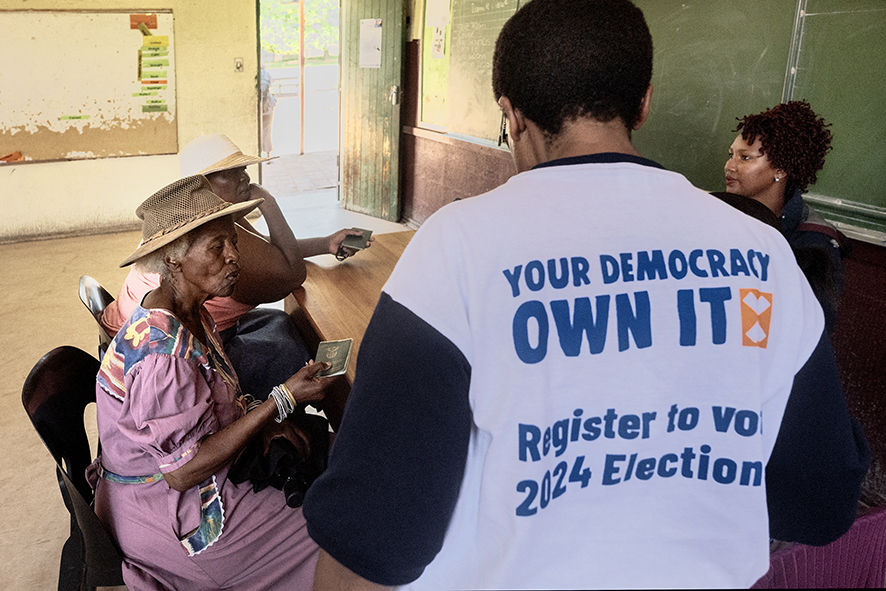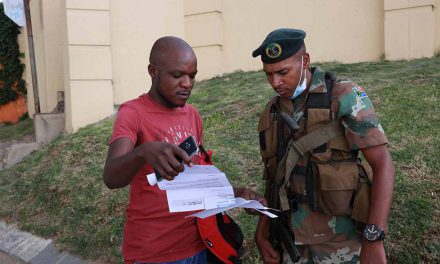Political accountability, which concerns the relationship that citizens maintain with their elected officials and vice versa, is one of the fundamental building blocks of a democratic system. One subject that is central to the discussion on political accountability in South Africa is electoral reform.
Over the last week, there has been some clarity, though not ultimate resolution, on this critical issue. First, there was the news that the Portfolio Committee on Home Affairs had resolved that the responsible minister, Aaron Motsoaledi, should reopen nominations to the legally mandated Electoral Reform Consultation Panel. Second, the Constitutional Court provided its ruling on the constitutionality of the new Electoral Amendment Act, which gives legal effect to aspects of our election system, including the establishment of the consultation panel itself.

Electoral Commission of South Africa (IEC) officials register voters during the nationwide voter registration campaign ahead of the 2024 general elections at a voting station in Soweto on November 18, 2023. Photo by Luca Sola/AFP
One entity for whom the clarity provided by the court’s ruling was welcome is the Electoral Commission of South Africa (IEC). The IEC now has a clear set of guidelines from which they can plan and manage next year’s general election. This is fortuitous, considering the IEC’s significance as one of the most effective and important public institutions we have. These differentiating features will prove critical in our impending era of more competitive elections.
However, the parliamentary resolution that nominations to the Electoral Reform Consultation Panel be reopened implies a further delay in addressing the long-term question of electoral reform. By law, the panel was supposed to have been established within 4 months of the commencement of the Electoral Amendment Act on 19 June 2023, meaning it should have been established by 19 October 2023.
This latest postponement further complicates the timeline for electoral reform because the consultation panel is also legally required to provide the Minister of Home Affairs with a final and comprehensive report on the pros and cons of several electoral options within 12 months of the as-yet-unannounced 2024 election date.
In recent years, discussions on electoral reform have predominantly focused on the status of independent candidates in our national and provincial election systems. Yet the status of independent candidates is only one component within the broader issue of political accountability.
In a policy briefing from June 2023, Good Governance Africa (GGA) delved into the question of political accountability, concentrating on the issues of electoral reform and coalition governance.
Our existing electoral system, grounded in the principle of proportionality—the idea that representation should broadly correspond with the share of votes parties receive—was the product of our transition to democracy. This system, which is meant to encourage inclusivity, was seen as a crucial ingredient in giving political representation to a broad segment of society in a manner that bridged our many divides as South Africans.
However, from the outset, critics, including most notably former President Mandela, identified that one aspect lacking from our system for provincial and national elections was direct accountability. That is, while at the local level citizens can directly elect their ward councillors, no similar arrangement exists at higher levels of government.
Today, the issue of direct accountability is more salient than ever. In GGA’s view, the most compelling rationale for why it is necessary to rethink our electoral system to foster direct accountability is the alarmingly low levels of trust that South Africans express in our democracy.
Methodologically robust surveys from sources like the Human Sciences Research Council (HSRC) and Afrobarometer suggest that public trust is at its lowest. To cite just two examples, the HSRC’s most recently published Social Attitudes Survey, indicated that as of 2021, only 25% of South Africans are satisfied with the state of our democracy, while only 29% express trust in parliament. Afrobarometer’s latest survey, completed in late 2022, indicates positive responses on the same two issues stood at a mere 25% and 23%, respectively.
One of GGA’s core recommendations on how to improve political accountability in South Africa is that our electoral system, particularly at the national and provincial levels, should strike a more equitable balance between direct accountability and inclusivity. The most effective way to do this is to adapt a version of our local electoral system to the provincial and national levels. This involves introducing a constituency element, with a second group of seats allocated post-election to maintain proportionality as mandated by the constitution.
The formal origin for this recommendation lies in the most recent Ministerial Advisory Committee on Electoral Reform, which concluded its work in mid-2021. As it relates to the National Assembly specifically, the advisory committee recommended that 200 seats be directly elected through single-member constituencies, while the remaining 200 would be distributed to ensure proportionality.
As several members of the advisory committee also noted, such a system would likely be the fairest way to integrate independents into our system while retaining the constitutional commitment to proportionality.
In as much as GGA believes that such a reform would help rebalance the relationship between citizens and political leaders, determining operational details requires careful consideration from the forthcoming Electoral Reform Consultation Panel. For instance, if constituencies were introduced, then the panel should evaluate whether it is more practical to expand the remit of the Municipal Demarcations Board to draw up provincial and national constituencies, or whether establishing a separate demarcation body to determine this is more prudent.
Regardless of the ultimate decision, one cornerstone of the process that the panel should emphasise is that the drawing of constituency boundaries be managed by a body free from political interference. This is because, whatever the structure of our electoral system, the management of our elections must remain protected from undue influence, whether domestic or foreign.
The significance of these deliberations is one reason why the Department of Home Affairs should urgently reopen public nominations for the Electoral Reform Consultation Panel. The work of the panel and the subsequent legislative process would need to ensure that the IEC is given sufficient time if it has to implement a new electoral system from the 2029 general elections onwards.
Ultimately, the most pivotal component of long-term electoral reform is ensuring that the public consultation process is broader and more comprehensive than it is for typical legislative processes. A fair electoral system lies at the heart of any democracy, and guaranteeing that ours has public support and legitimacy is therefore paramount.
A version of this article appeared in Business Day on 7 December 2023.
Pranish Desai is a doctoral student in political science at the Massachusetts Institute of Technology. His core areas of focus are in comparative politics and political methodology, with a specific interest in the politics of Southern Africa. Between 2021 and 2024, Pranish held several key positions within the Governance Insights and Analytics programme at GGA. In these roles, he was centrally responsible for the elevation and enhancement of the Governance Performance Index as GGA's flagship governance assessment tool. Before departing GGA, Pranish also played a key role in the development of our strategic framework for the 2024-2028 period.







